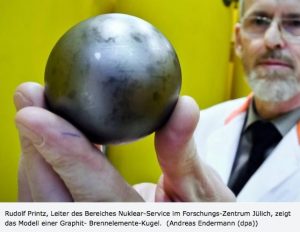
US-Germany Research Cooperation over Highly Radioactive German Spent Fuel Reprocessing at DOE’s Savannah River Site Drags On, Continues to Violate Nuclear Non-Proliferation Norms
The Savannah River Operations Office has responded to a Freedom of information Act (FOIA) request from Savannah River Site Watch (SRS Watch) pertaining to the import and processing of highly radioactive German spent fuel at SRS. Savanna River Site Watch (SRS Watch) and German colleagues remain opposed to the plan to export the spent fuel to SRS for dumping.
Cooperation continues between the Savannah River National Lab – operated by contractor Batelle Savannah River Alliance, via Savannah River Nuclear Solutions, the contractor managing many SRS activities – and the Jülicher Entsorgungsgesellschaft für Nuklearanlagen (JEN), located at the Forschungszentrum Jülich (Jülich Research Center), near the border with the Netherlands.
The goals of the project appear to have been greatly reduced and it may be on life support. The original expectation by some at SRS was to import, process and dump at SRS (and perhaps other sites) a large quantity of highly radioactive spent fuel in the form of graphite pebbles which had been used as fuel in the long-closed ATR and THTR gas-cooled reactors. It is unclear if any small quantities unirradiated or irradiated pebbles have been sent to SRS for research purposes, but likely not as we are not aware that German export licenses were obtained.
Now, the SRS-JEN agreement seems to be focused on the development of a cooperation agreement, perhaps aimed at commercialization of the processing of irradiated graphite fuel. Such fuel in Germany contains both low-enriched uranium (LEU) and highly enriched uranium (HEU), which, if separated is bomb-grade material. Some of this uranium was supplied by the US. As the LEU and HEU pebbles are mixed in large CASTOR storage casks, there has been no explanation about how the casks would be opened and the LEU and HEU pebbles containing US uranium would separated.
It appears that this work is being done in violation of sound nuclear nonproliferation policies as it’s continuing without the development of a nuclear nonproliferation (risk) assessment (NPA) for the development of such HEU-separation technology (aka reprocessing). As this technology, if it were to come to fruition, could be commercialized, it is essential that a NPA now be conducted. DOE is failing to act in the interest of nuclear non-proliferation by refusing to prepare the NPA, which SRS Watch has requested in the past. DOE’s National Nuclear Security Administration has said the graphite fuel poses no proliferation risk being left for disposal in Germany. (See NNSA memo: DOE memo on no proliferation risk of AVR spent fuel August 1 2013
Modification # 9 to the SRS-JEN agreement runs through February 28, 2023 and the cost, paid for by JEN, has risen to $7.5 million. The “Statement of Work” (SOW) calls for development of a Cooperative Research and Development Agreement (CRADA)/Strategic Partnership Project (SPP).
FOIA-response over letter to SRS Watch, March 22, 2022: SRO-2022-00522-F Clements final letter WFO 22 March 2022
Agreement between SRS & JEN, Modification #9, signed 23 February 2022 , obtained via FOIA request by SRS Watch: 2022-02-21-WFO-13-021 Mod No. 9 received 23 March 2022
At least two documents have been withheld from release, with the claim they meet exemptions allowed under FOIA:
“SRNL HTGR Technology Maturation Activities”
“SRNL HTGR Technology Maturation Cost Estimate”
SRS Watch letter to DOE, February 20, 2020, requesting that the SRS-JEN cooperation be cancelled. DOE did not have the courtesy to respond. See letter here: letter to DOE terminate SRS JEN agreement Feb 20 2020
SRS Watch update, July 13, 2022: https://srswatch.org/wp-content/uploads/2022/06/Status-of-Savannah-River-Site-JEN-cooperation-July-13-2022.pdf
Photo: Yellow CASTOR storage casks, containing German spent fuel balls. Don’t dump these on SRS!